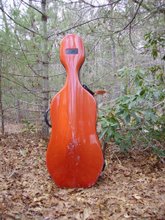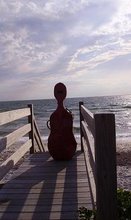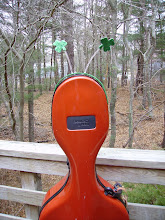Sunday, January 28, 2007
January 27 March on Washington
Appalled by Bush's plan to send 20,000 more troops to Iraq, I joined the antiwar protest in Washington DC this weekend. I liked the purpose of it--to ask Congress to represent the people who elected them, stand up to "the decider," and support the troops by bringing them home.
At 10 pm Friday night, my daughter and I boarded a bus sponsored by Cape Codders United for Peace and Justice; we arrived in Washington about 8 am. Our first stop was for a delicious buffet breakfast, generously provided by the Friends at the Quaker meeting house on Florida Ave., just around the corner from where my husband and I lived when we were first married.
I went to college in Washington DC, back in the 1960s, during the Vietnam war era, and my husband and I lived there for another four years, so I am not a stranger to anti-war protests, but I had not been to one in years.
After breakfast, my daughter and I walked down to the mall, a distance of maybe 3 miles. The streets seemed very quiet, though occasionally we would see another group of people from our bus. We walked by the White House. Only one demonstrator, a regular, was out front. There were other people about, but they were waiting in line for White House tours.
We got to the mall at about 11 am, just as the speeches were starting. We passed people selling buttons and giving away literature and signs. We picked a couple: "I voted for Peace" and "Impeach Cheney first and then Bush." We passed a large group of jovial people from Melbourne, FL, taking photos of themselves in front of their banner. Suddenly emotional, I started crying, in part because so many people had come from long distances, and in part because, I was afraid that there would not be enough people to really make a difference in U.S. foreign policy. I am not sure how many people came; the media said 100,000; the organizers, United for Peace and Justice, claim 500,000 (the size of the largests anti-Vietnam protests).
In many ways, this protest was a lot like the protests of the 60s. People felt fervently about the issues; signs and banners colorfully addressed the issues; celebrities and peace and justice leaders spoke; enthusiasm and solidarity were high.
But there were differences too. The 60s demonstrations were driven by college students and other young people. All age groups and types of people were represented at yesterday's protest, but gray-haired former protesters predominated. The current absence of a military draft might be a factor.
In the 60s, the demonstrations were against the president's policies, the congress, the military-industrial complex, chemical and other corporations, and--anyone over 30. The January 27 protest was directed against Bush and Cheney, and implied a faith that Congress would in fact act against the war. There were many, many organizations: veterans for peace, women for peace, Gold Star families for peace, people serving in the military for peace, kids for peace, socialists, unions, religious groups, nuclear disarmament groups, people concerned about global warming, people wanting Guantanamo closed, gay/bisexual/transgender groups, people wanting to end Israeli occupation of Palestine, local and national peace organizations, and more.
My daughter and I carried white roses, symbolizing "I will not be silent," a reference to resistance to Hitler's attempt to eradicate Jews and other "undesirables."
After the speeches, mostly compelling and energizing, we began the slow march around the Capitol building. I was worried about getting back to the Friends meeting house in time to catch the bus home, so after a time, we stepped out of the march and joined others sitting around the Capitol building reflecting pool. At this point I took out my flute (the cello would have been a bit unwieldy) and played a little. Just something I had to do.
We returned to the Friends Meeting house for a wonderful dinner of soup, salads, cheeses, breads, nuts, and cookies, and looked forward to boarding the bus home at 6:30 pm. At 6:15, we learned that our bus had broken down, .2 mile away from the meeting house. Lug nuts had become loose, and one of the rear wheels had fallen off or was about to fall off. Grateful that this had happened before we had started out, we settled down in various comfortably furnished rooms, and waited. We talked, we read, we slept, we ate, I worked on a project I had brought with me. The Quakers were great throughout it all, offering blankets, food, comfort, and support. Finally, at 2:45 am, we had a new bus, and we headed for home, arriving back on the Cape at noon.
Exhausted and aching from the walking and sitting on a bus so long, we we happy that we went. I hope we made a difference. I know there is much more to do.
Subscribe to:
Post Comments (Atom)













2 comments:
I was fortunate enough to see the article about your participation in this march in our local Cape Cod newspaper, and to be able to discuss it with you as well. Thanks for publishing your experience in D.C. Folks need to be encouraged by actions such as yours, which indeed display our right to express dismay at the misguided "leadership" with which this country has been burdened for too long. We can only hope for better...
Thanks Laura,
I wondered if it would do any good to join the demonstration, given the president's obliviousness to opposing viewpoints, but ended up believing it was a positive action, with multiple impacts, including continued coverage through the newspaper article and discussions with others, and the impact of the trip on me. I learned a lot about the war, the public decision-making process, and the fact that it is relatively easy to take a stand. And important to do so.
Post a Comment